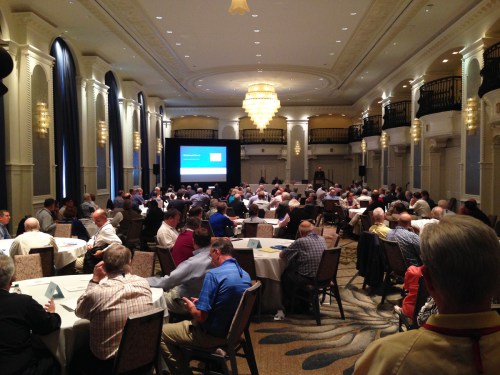From ENS
The House of Bishops spent part of the last day of its meeting in Detroit discussing diversity in the bishop-election process, as well as impairment of church leaders due to substance abuse and mental-health issues.
After a short discussion, the bishops referred a resolution on diversity in the bishop-election process to the General Convention Task Force on the Episcopacy. The resolution first came to the bishops at their spring retreat. In that iteration it would have had the bishops reserve the option to withhold their consent after any episcopal election that did not include at least two qualified people of color and two qualified women. In the spring, the bishops tabled the resolution until this meeting.
The substitute resolution states that the House of Bishops “regrets the extent to which we remain predominantly a body of white males” and commends those dioceses that have elected or included among their nominees women and people “outside the dominant culture.”
It encourages diocesan standing committees and nominating bodies to continue that trend. And it encourages standing committees and bishops with jurisdiction, which must consent to any bishop election in the church, to “give serious consideration to the inclusivity of the search process and the diversity of the final slate of candidates in making their decision.”
However, not all bishops’ agreed with the referral.
Bishop Suffragan Dena Harrison of Texas, referring to herself as “one of the categories of people referenced in this resolution,” told her colleagues that after 10 years in the house she had “grown very weary of this house’s propensity to refer to others the responsibility” for educating dioceses about accepting people other than white males as bishops.
“We just observed that by the time an election occurs it’s too late; that if the leadership of the diocese has not prepared the culture to accept women of color, men of color, women, it’s not going to happen. And I find it very disingenuous that this house is so facile with instructing other groups about their responsibilities in this area,” Harrison said. “If this house wished to seriously consider making change, it would have a very different approach to this conversation.”
Also during that session, Diocese of Albany Bishop Bill Love, who called himself “one of the few theologically conservative bishops representing theologically conservative dioceses,” said he was “somewhat nervous about the wider church trying to become more involved in the elections within in dioceses.”
“No doubt there a lot of folks that would like to see Albany move in a different direction,” Love said, urging caution about whether theological diversity also becomes an issue in elections.
this post is drawn from a post at ENS by By Mary Frances Schjonberg
image: Mary Frances Schjonberg/Episcopal News Service

